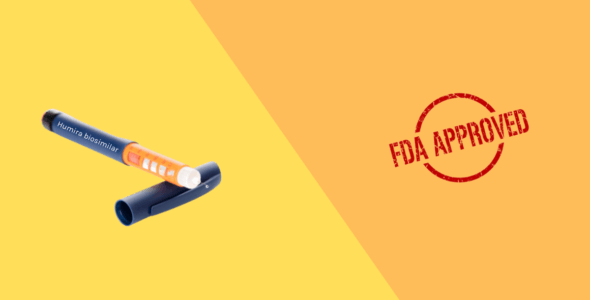Humira alternatives: which other medications can I take?
Table of contents
Humira is the brand name for a human monoclonal antibody, FDA-approved (Food and Drug Administration), and manufactured by Abbvie. It is classed as a Tumor Necrosis Factor (TNF) inhibitor and as a biologic drug. TNF is produced naturally in the body and has been shown to be linked to inflammation.
Humira blocks the effects of TNF preventing inflammation in autoimmune diseases such as ulcerative colitis, rheumatoid arthritis, ankylosing spondylitis, Crohn’s Disease, hidradenitis suppurativa, psoriatic arthritis, plaque psoriasis, uveitis, and polyarticular juvenile idiopathic arthritis. Treatment with TNF inhibitors can also suppress the normal action of the immune system and cause serious infections and lymphoma.
Here, we will look at alternative drugs to Humira as potential treatment options for these medical conditions.
What biologic is similar to Humira?
A biologic drug is produced from live organisms or their products for the diagnosis, prevention, or treatment of diseases. Biologic medications include antibodies, vaccines, and interleukins. Biosimilar drugs are biological drugs shown to be as safe, to work as well, and to work in the same way as their reference drug.
Biosimilars include Cimzia (certolizumab pegol), Enbrel (etanercept), Simponi (golimumab), Remicade (infliximab), and Cyltezo, an interchangeable biosimilar available as an alternative to Humira.
Speak to a healthcare professional for medical advice if you are considering changing your therapy from Humira to an alternative. Discontinuing Humira or any other biologic drug abruptly may cause withdrawal effects and your body developing antibodies against the prescription drug.
What is a good substitute for Humira?
Differences in the ability to manage inflammation, the method of administration, how often treatment is administered, and differences in side effects may make one alternative more suitable than another. These may include:
- Methotrexate is a first line DMARD medication for people suffering from rheumatoid arthritis. Methotreaxate is taken for 3 to 4 months. If results are not seen after this time another DMARD, a biologic agent, or other classe of medication may be added. Methotrexate is much less expensive than biologic medications such as Humira. Methotrexate side effects include gastrointestinal disturbances, such as nausea, and vomiting, liver toxicity and suppression of the immune system. Side effects of methotrexate may be reduced by separating and taking the weekly dose over 2 or 3 doses. Those taking methotrexate will need blood tests every 3 months as a minimum. Methotrexate is not recommended for use in people with kidney problems
- Remicade is a monoclonal antibody indicated for the treatment of psoriatic arthritis and Crohn’s Disease. Remicade is given as an intravenous infusion and is not self-administered. Remicade side effects include infusion reactions such as fever, and skin reactions. These side effects can occur at an increased risk if treatments are missed. Other common side effects of Remicade are similar to those of Humira. Remicade has the convenience of being given every 4 to 8 weeks
- Orencia (abatacept) belongs to a class of drugs known as T-cell costimulation modulators which acts as a blocker of T-cells in your immune system. Orencia can be given as a flat-dose subcutaneous injection or as an intravenous infusion based on your body weight. A medical review of all other medications is needed before starting treatment with this medication as Orencia interacts with other medications. Orencia may be added to DMARDs to improve the management of rheumatoid arthritis. It should not be added to a treatment already using a TNF–inhibitor like Humira as it could cause serious infections. Other side effects of Orencia include upper respiratory tract infections, sinus infections, and bronchitis
- Rituxan (rituximab) is also a monoclonal antibody medication and is classed as a B lymphocyte-depleting agent. B cells are thought to be related to the progression and development of rheumatoid arthritis. Rituxan is not recommended for use in people with severe active infections. Those treated with Rituxan will require prophylactic treatment against infections during treatment and up to 1 year after treatment has stopped. Rituxan is given as an IV infusion under medical supervision. Its side effects include infusion-related reactions, and reactivation of hepatitis B
- Xeljanz belongs to a class of medications known as Janus Kinase Inhibitors which block the JAK enzyme that normally signals cytokines in the body, causing tissue and joint and inflammation. Xeljanz (tofacitinib) is a tablet that is taken twice each day. Patients lipid profiles, neutrophils and lymphocytes, and liver function are monitored during treatment, and changes to dosing will be based on results to these tests. Xeljanz may cause serious side effects such as sudden cardiovascular death and thrombosis in patients 50 years of age or older who have other cardiovascular risk factors. Other side effects of Xeljanz include upper respiratory tract infection, headaches, diarrhea, skin rash, nausea, vomiting, blood clots, reduced white blood cells, blood clots and risks of other cancers
What works better than Humira?
Alternatives to Humira include methotrexate, Orencia, Remicade, and Rituxan. How well these work for an individual will depend on the individual and the condition they are being treated for. Discuss your treatment plan with your doctor to decide which therapy is best for you.
Is Humira or methotrexate better?
Methotrexate is classed as a DMARD (Disease-modifying antirheumatic drug) and has often been used early in the treatment of rheumatoid arthritis. Methotrexate is normally taken as an oral tablet, while Humira is administered as a subcutaneous injection. Which of these two treatments works best will depend on the individual being treated and the condition they are being treated for. Speak to your doctor to discuss your options.
Natural alternatives to Humira
The key thing to be aware of is that natural supplements such as probiotics, or aloe have not been tested in the same way for safety or effectiveness as conventional drugs and are not approved by the FDA (Food and Drug Administration). Speak to your primary care doctor or healthcare provider for medical advice before using any of these supplements.
Humira generic alternative
Humira is not available in a generic version.
Amgevita vs Humira
Amjevita (adalimumab-atto), an anti-TNF-alpha monoclonal antibody is the first biosimilar product to Humira approved by the FDA. It is used to treat rheumatoid arthritis, psoriatic arthritis, juvenile idiopathic arthritis, Crohn’s disease, ankylosing spondylitis, plaque psoriasis, and ulcerative colitis. Amjevita is however not approved to treat uveitis or hidradenitis suppurativa. Both Amjevita and Humira are administered as a subcutaneous injections.
Medically reviewed
A medical professional has reviewed this article.


Jamie Winn, PharmD
Jamie Winn, PharmD
Dr. Jamie Winn received his Doctor of Pharmacy in 2002 from the University of South Carolina College of Pharmacy, Columbia, SC. Jamie is a medical reviewer for NiceRx.







